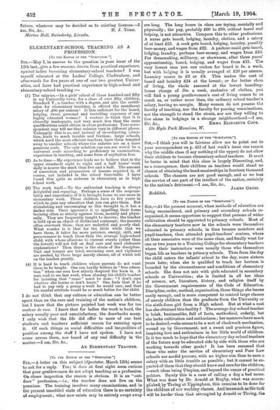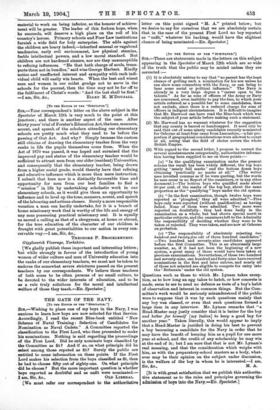[To THE EDITOR OF THE "SPIECTATOP..".1
SIR,—At the present moment, when methods of education are being reconsidered, and primary and secondary schools re- organised, it seems opportune to suggest that persons of wider cultivation should be appointed to primary schools. Most of the elementary teachers now in the schools were themselves educated in primary schools, in time became monitors and pupil-teachers, then attended pupil-teachers' centres, where all their associates were of the same class, and finally went for one or two years to a Training College for elementary teachers where their instructors were usually those who themselves began life as teachers in primary schools. Thus from the day the child enters the infants' school to the day, some sixteen years later, when she is qualified to teach her horizon is bounded by the circumstances and conditions of elementary schools. She does not mix with girls educated in secondary schools or Universities; she is limited in all her ideas of science, art, literature, history, and religion itself by the Government requirements of the Code of Education. Discipline, order, method, organisation, these things she learns easily enough, and is more competent to control large classes of unruly children than the graduate from the University or the sixth-form girl from a High school. But at what a cost has she obtained this facility ? The average day-school teacher is brisk, businesslike, full of facts, methodical, orderly, but she lacks cultivation and enthusiasm ; her manners leave much to be desired,—she seems to be a sort of clockwork mechanism, wound up by Government, not a sweet and gracious figure, inspiring love and enthusiasm in her little world of children. Is it too much to hope that the elementary day-school teachers of the future may be educated side by side with those who are working towards other goals ? It has been assumed that those who enter the service of elementary and Poor Law schools are sordid persons, with no higher aim than to earn a salary with as little trouble as possible ; but it cannot be ex- pected of them that they should know and care for the children, —such ideas being Utopian, and beyond the range of practical pohtIcs. Surely this is a case of calling a dog a bad name. What was done by Dr. Arnold at Rugby, what was accom- plished, by Thring at Uppingham, this remains to be done for the children of our working classes. And inasmuch as the task will be harder than that attempted by Arnold or Thring, the
material to work on being inferior, so the honour of achieve- ment will be greater. The leader of this forlorn hope, when he succeeds, will deserve a high place on the roll of his country's heroes. Primary schools and Poor Law institutions furnish a wide field for holy enterprise. The odds against the children are heavy indeed,—inherited sensual or vagabond tendencies, early evil environment, low physical stamina, feeble intellectual powers, and a low moral standard. But children are not hardened sinners, nor are they unsusceptible to refining influences. "He that hath charge of souls, trans- ports them not in bundles," said wise George Herbert. Kindly notice and unaffected interest and sympathy with each indi- vidual child will easily win hearts. When the best and wisest men and women in our midst grudge not to serve in the schools for the poorest, then the time may not be far off to the fulfilment of Christ's words : "And the last shall be first."











































 Previous page
Previous page